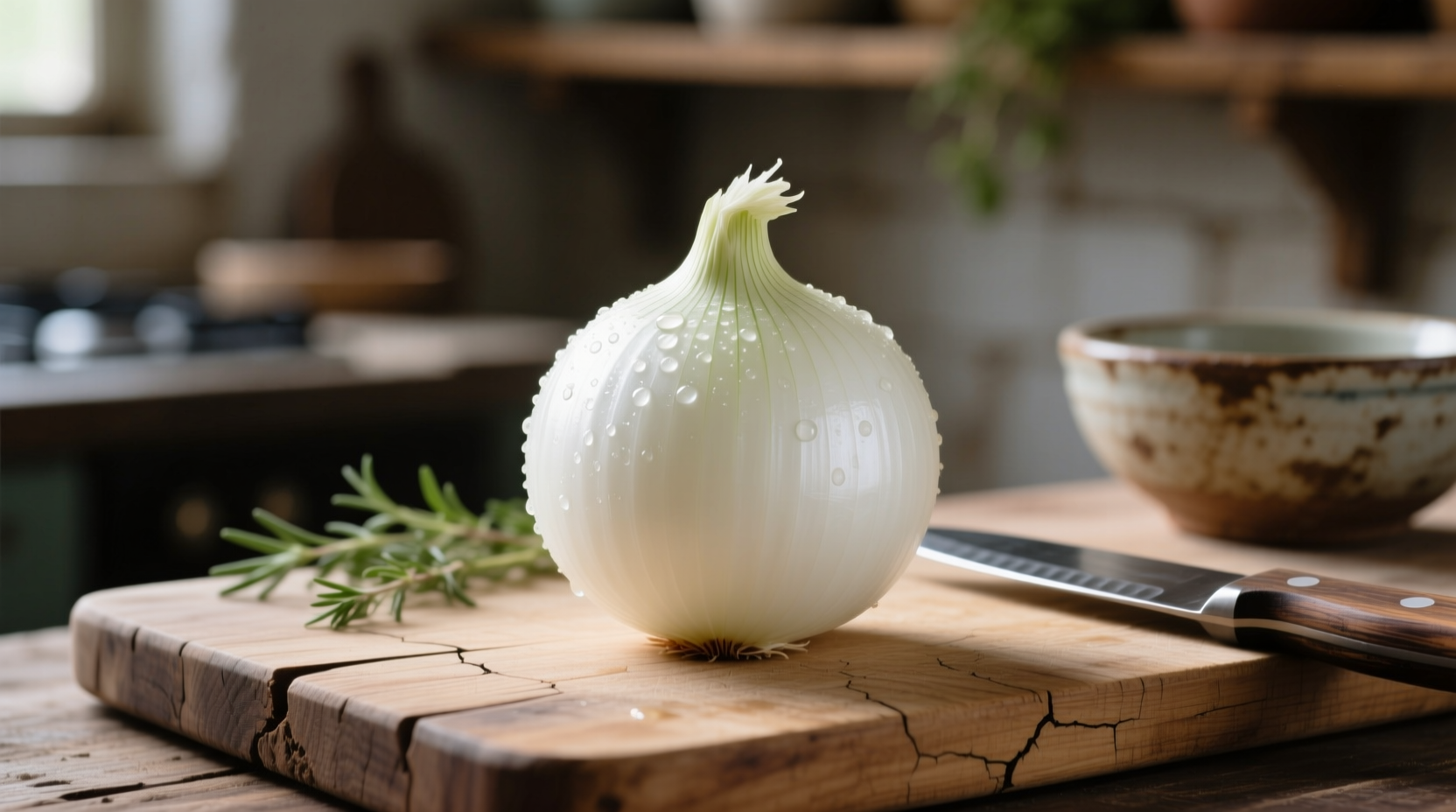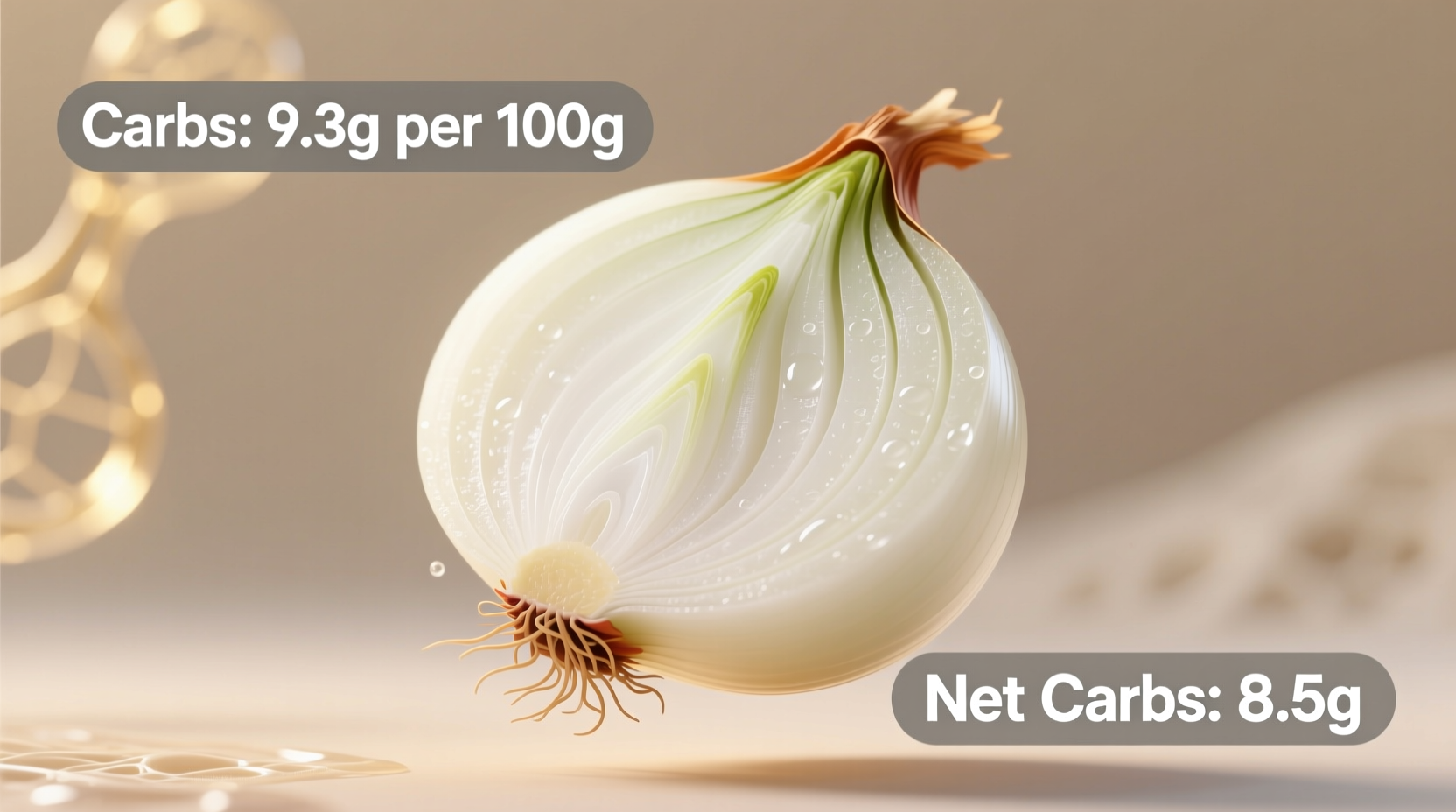Understanding the carbohydrate composition of white onions helps home cooks and health-conscious eaters make informed decisions about incorporating this versatile vegetable into their meals. Whether you're managing blood sugar levels, following a specific diet, or simply curious about nutritional content, knowing exactly what's in your food matters.
Breaking Down White Onion Carbohydrates
When examining the carbohydrate profile of white onions, it's essential to understand the different components that make up the total count. Unlike processed foods with added sugars, white onions contain naturally occurring carbohydrates that contribute to their flavor and nutritional benefits.
The primary carbohydrate components in raw white onions include:
- Dietary fiber - Supports digestive health and helps moderate blood sugar response
- Natural sugars - Primarily fructose, glucose, and sucrose that give onions their characteristic sweetness
- Other carbs - Includes complex carbohydrates that break down during digestion
Unlike many vegetables, onions develop more complex flavor compounds when cooked, but their fundamental carbohydrate composition remains relatively stable regardless of preparation method.
White Onion Carb Comparison Across Varieties
| Onion Type | Total Carbs (per 100g) | Sugars (per 100g) | Fiber (per 100g) | Calories |
|---|---|---|---|---|
| White Onion | 9.34g | 4.24g | 1.7g | 42 |
| Yellow Onion | 9.03g | 4.22g | 1.8g | 40 |
| Red Onion | 8.99g | 4.18g | 1.7g | 40 |
| Green Onions | 7.34g | 2.69g | 2.6g | 32 |
Source: USDA FoodData Central, 2023 nutrient analysis
This comparison reveals that while white onions contain slightly more total carbohydrates than other common varieties, the differences are minimal. The fiber content remains relatively consistent across types, with green onions offering the highest fiber-to-carb ratio. These small variations typically don't significantly impact most dietary plans unless consumed in very large quantities.

Practical Carb Considerations for Home Cooking
When planning meals, understanding how white onions fit into your daily carbohydrate budget can help you make informed choices without sacrificing flavor. Consider these practical applications:
Daily Carb Budget Integration
For most adults following a standard 2,000-calorie diet, the recommended daily carbohydrate intake ranges from 225-325 grams. A quarter cup of chopped white onion (approximately 40g) contributes only about 3.7 grams of carbohydrates to your meal. This makes white onions an excellent flavor enhancer even for those monitoring their carb intake.
Cooking Methods and Carb Impact
Unlike some vegetables that significantly change their nutritional profile when cooked, white onions maintain relatively consistent carbohydrate levels through various preparation methods:
- Raw - Maximum fiber retention, crisp texture
- Sautéed - Natural sugars caramelize, enhancing sweetness without adding carbs
- Roasted - Concentrates flavors but doesn't increase carb content
- Pickled - Vinegar-based pickling doesn't alter carb count significantly
The only preparation method that substantially affects carb content is candying, which adds external sugars to the onions.
Diet-Specific Considerations
White onions can fit into various dietary approaches with appropriate portion control. Understanding the context boundaries helps determine their suitability for different eating patterns:
For Low-Carb and Ketogenic Diets
While white onions contain more carbs than some vegetables, they can still be incorporated strategically. A single serving (1/4 cup chopped) contains approximately 3.7g net carbs (total carbs minus fiber), which fits within many low-carb meal plans when balanced with other ingredients. Those following strict ketogenic diets might limit portions to 2-3 tablespoons per meal to maintain ketosis.
For Diabetic Meal Planning
With a glycemic load of approximately 2 per 100g serving, white onions have minimal impact on blood sugar levels. The fiber content helps moderate the absorption of natural sugars. Most diabetes nutrition guidelines consider onions a non-starchy vegetable that can be consumed freely as part of balanced meals.
For General Healthy Eating
For individuals without specific dietary restrictions, white onions offer valuable nutrients beyond their carbohydrate content, including vitamin C, B vitamins, and beneficial phytonutrients. Their moderate carb content makes them suitable for regular inclusion in balanced diets without concern.
Maximizing Flavor While Managing Carbs
Professional chefs and home cooks alike can enjoy the distinctive flavor of white onions while being mindful of carbohydrate content through these practical techniques:
- Use white onions as a flavor base in soups and stews where small amounts create significant flavor impact
- Combine with lower-carb vegetables like zucchini or bell peppers to stretch portions
- Try using white onion tops (greens) which have slightly fewer carbs than the bulb
- When following low-carb diets, substitute half the onion with celery or fennel for similar texture with fewer carbs
- For maximum flavor extraction, slice onions thinly to distribute flavor more effectively with less volume
Remember that the strong flavor profile of white onions means you often need less than you might think to achieve excellent results in your cooking.
Frequently Asked Questions
How many carbs are in a medium white onion?
A medium white onion (approximately 148g) contains about 13.8 grams of total carbohydrates, with 6.3 grams of natural sugars and 2.5 grams of dietary fiber. This represents roughly 5% of the recommended daily carbohydrate intake for a standard 2,000-calorie diet.
Are white onions high in carbohydrates compared to other vegetables?
White onions contain moderate carbohydrates compared to other vegetables. They have slightly more carbs than leafy greens or zucchini but fewer than starchy vegetables like potatoes or corn. With 9.3g of carbs per 100g, they fall in the middle range of non-starchy vegetables, making them suitable for most dietary patterns when consumed in reasonable portions.
Do cooked white onions have the same carb content as raw?
Yes, cooking doesn't significantly change the carbohydrate content of white onions. Whether raw, sautéed, roasted, or grilled, the total carb count remains relatively consistent per serving. The primary difference is that cooking concentrates flavors as water content reduces, so a cup of cooked onions contains more onion (and thus slightly more carbs) than a cup of raw onions due to shrinkage.
Can I eat white onions on a low-carb diet?
Yes, you can include white onions in a low-carb diet with portion control. A quarter cup of chopped white onion contains approximately 3.7g net carbs. Many low-carb dieters successfully incorporate small amounts of white onions for flavor without exceeding their daily carb limits. For stricter low-carb protocols, consider using white onion greens which have slightly fewer carbs than the bulb portion.











 浙公网安备
33010002000092号
浙公网安备
33010002000092号 浙B2-20120091-4
浙B2-20120091-4